|
|
|
Sort Order |
|
|
|
Items / Page
|
|
|
|
|
|
|
| Srl | Item |
| 1 |
ID:
124141
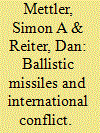

|
|
|
|
|
| Publication |
2013.
|
| Summary/Abstract |
Governments are concerned about the dangers posed by ballistic missiles. However, there is almost no theoretical or empirical scholarship on ballistic missiles. This article presents and tests the conventional wisdom that the spread of ballistic missiles makes conflict more likely. Original data on ballistic missiles and on crisis initiation is collected, and analysis using a variety of statistical models is conducted. It is found that among all directed dyads from 1946 to 2007, potential challengers possessing ballistic missiles are significantly more likely to initiate international crises. Further, potential targets armed with ballistic missiles are significantly less likely to be challenged. Crises are less likely to escalate when targets are armed with missiles. The results are obtained after accounting for several control variables. Analysis reveals that the findings are not affected by possible endogeneity bias. The analysis also reveals complex interactive effects between ballistic missiles and nuclear weapons on the onset of international crises.
|
|
|
|
|
|
|
|
|
|
|
|
|
|
|
|
| 2 |
ID:
124143
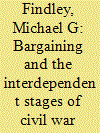

|
|
|
|
|
| Publication |
2013.
|
| Summary/Abstract |
This article examines civil war resolution as a process comprised of multiple interdependent stages. It engages directly the idea that peace emerges only as a process comprised of battle, negotiation, agreement, and implementation of an agreement. I hypothesize that events at earlier stages of the peace process have implications for later stages, but not always in the same ways. Drawing on bargaining models of war, I consider how two factors that might prevent successful bargaining-stalemates and the number of actors-can encourage cooperation early in a peace process but impede lasting cooperation at later stages. Using a nested dichotomies statistical approach to capture interdependence, I find support for the argument that stalemates and the number of actors have different effects depending on the stage of the peace process. The results substantiate the need in theoretical and policy work to consider peace as an interdependent, sequential process.
|
|
|
|
|
|
|
|
|
|
|
|
|
|
|
|
| 3 |
ID:
124137
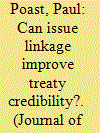

|
|
|
|
|
| Publication |
2013.
|
| Summary/Abstract |
Can issue linkage, the combining of multiple issues into a single agreement, enhance the credibility of an agreement? I use the alliance relations of buffer states (states located between two recently or currently warring rivals) to test the claim that issue linkage enhances compliance with treaty obligations. The alliance relations of buffer states create a "hard case" for treaty compliance because, by being prone to invasion and occupation, buffer states have difficulties inducing states to remain committed to an alliance agreement. Hence, if linkage provisions can enhance the credibility of alliance commitments for buffer states, then linkage provisions should improve treaty compliance in nearly any context. I find that buffer states in alliances with trade provisions experience fewer opportunistic violations of the alliance terms, avoid occupation and invasion at a higher rate, and experience fewer third-party attacks than buffer states in other alliance arrangements.
|
|
|
|
|
|
|
|
|
|
|
|
|
|
|
|
| 4 |
ID:
124138
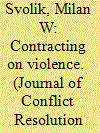

|
|
|
|
|
| Publication |
2013.
|
| Summary/Abstract |
Why does the military intervene in the politics of some countries but remain under firm civilian control in others? The paper argues that the origins of military intervention in politics lie in a fundamental moral hazard problem associated with authoritarian repression. Dictators must deter those who are excluded from power from challenging them. When underlying, polity-wide conflict results in threats to the regime that take the particular form of mass, organized, and potentially violent opposition, the military is the only force capable of defeating them. The military exploits this pivotal position by demanding greater institutional autonomy as well as a say in policy, and it threatens to intervene if the civilian leadership departs from a subsequent compromise on these issues. A game-theoretic analysis of such contracting on violence implies that the likelihood of military intervention in politics should be greatest at intermediate levels of mass threats. Original, large-N data on military intervention support these claims.
|
|
|
|
|
|
|
|
|
|
|
|
|
|
|
|
| 5 |
ID:
124142
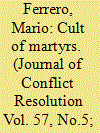

|
|
|
|
|
| Publication |
2013.
|
| Summary/Abstract |
This article suggests a rational explanation for extreme voluntary sacrifice in situations in which the state of the world when the decision must be made is observable only by the agent. Such explanation is the cult of martyrs, heroes, and saints. This cult may get out of control and fuel fanaticism, or excessive sacrifice from the standpoint of the sponsoring organization. A survey of the historical evidence of Christian martyrdom strongly suggests that martyrs were driven by the expectation of a cult in this world, not by otherworldly rewards. In particular, it is argued that the evidence of excess martyrdom in both Muslim Spain and the Roman Empire strongly speaks for the cult theory.
|
|
|
|
|
|
|
|
|
|
|
|
|
|
|
|
| 6 |
ID:
124139


|
|
|
|
|
| Publication |
2013.
|
| Summary/Abstract |
The article analyzes the impact of private military companies (PMCs) on the duration of civil wars in Africa from 1990 to 2008. We develop an "opportunity structure" theory to argue that while PMCs are profit-oriented entities, the prevalent opportunities in conflicts will determine how they behave in war zones. Empirical findings for civil wars with at least 1,000 battle deaths show that as level of competition among government-hired PMCs increases, they are more likely to deliver optimal services and help bring an end to violence. In the absence of competition, the prevalent structure creates opportunities for PMCs to underperform in order to maximize profits by staying in conflicts longer. The authors also show that swift cessation of hostilities could benefit those profit-seeking PMCs that are compensated with contracts to extract natural resources because resource extraction generates more wealth in peace time. In such cases, the prevalent opportunities in conflict create an incentive for companies to deliver optimal service and terminate hostilities.
|
|
|
|
|
|
|
|
|
|
|
|
|
|
|
|
| 7 |
ID:
124140
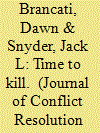

|
|
|
|
|
| Publication |
2013.
|
| Summary/Abstract |
Elections constitute a fundamental element of postconflict peacebuilding efforts in the post-cold war era and are often held soon after conflicts end. Yet, the impact of early elections on postconflict stability is the subject of sharp debate. While some argue that early elections facilitate peace agreements, hasten democratization, and ensure postconflict stability, others suggest that they undermine genuine democracy and spark a renewal in fighting. In this study, we argue that holding elections soon after a civil war ends generally increases the likelihood of renewed fighting, but that favorable conditions, including decisive victories, demobilization, peacekeeping, power sharing, and strong political, administrative and judicial institutions, can mitigate this risk. We attempt to reconcile the extant qualitative debate on postconflict elections through a quantitative analysis of all civil wars ending in the post-World War II period.
|
|
|
|
|
|
|
|
|
|
|
|
|
|
|
|
|
|
|
|
|